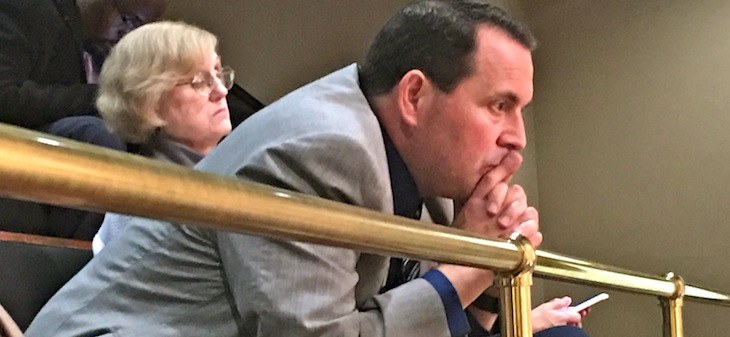Governor signs bill banning abortion procedure; measure fails to make March primary permanent
by January 26, 2017 8:54 pm 705 views

Rep. Andy Mayberry, R-East End, watches the debate regarding his abortion bill from the Senate gallery.
Gov. Asa Hutchinson signed into law Thursday (Jan. 26) a bill that would ban the most common procedure for second-term abortions.
The Arkansas Unborn Child Protection from Dismemberment Abortion Act, by Rep. Andy Mayberry, R-East End, would outlaw abortions where the unborn child is dismembered and extracted from the uterus one piece at a time. The medical term is dilation and evacuation. The vast majority of second-trimester abortions are performed using this procedure.
Hutchinson signed the bill hours after it was passed by the Senate, 25-6.
Introducing the bill, Sen. David Sanders, R-Little Rock, called it a “gruesome procedure.” Asked by Sen. Joyce Elliott, D-Little Rock, if doctors shouldn’t have discretion, Sanders said the Legislature takes many prescriptive actions. He described his own experience when, as a newspaper columnist, he spent a day in an abortion clinic and witnessed two consultations and a procedure where the fetus was alive and moving on the ultrasound before the procedure.
Arguing against the bill was Sen. Will Bond, D-Little Rock, who said the bill is very restrictive with only an exception allowed when the mother faces serious health risks. He said mothers can learn that a fetus has a serious problem after 12 weeks.
Senators later passed House Bill 1033 by Mayberry, which would amend the Tobacco Settlement Proceeds Act, an initiated act passed by voters in 2000 to serve Medicaid recipients, to fund services for developmentally disabled children and adults. About 3,000 individuals are on a waiting list, some since 2007, to receive home- and community-based services. Gov. Asa Hutchinson proposed the idea in September.
Currently $8.5 million of the Tobacco Settlement money each year is not being spent because the individuals it originally served are now covered under the federal Affordable Care Act. That money has been accruing and, if used to address the waiting list, would be matched by about $20 million in federal funds annually, enabling the waiting list to be reduced by 500-900 individuals.
Mayberry, who watched the proceedings intently from the Senate gallery, said he was pleased both bills had passed.
“A lot of people don’t necessarily understand this or see the full picture, but these are both pro-life bills,” he said. “We talk about encouraging women to follow through a birth with a child who may be born into a circumstance that isn’t picture perfect. To me, being pro-life, that doesn’t mean that once that child, that we just need to turn our backs on the mother and the families, which is where the DD waiting list bill comes in. We’ve got a lot of families who have elected to bring a child into the world knowing that that child may have some difficult challenges, and so this is an important opportunity for us to be able to help out those families.”
Meanwhile, the Senate failed by one vote, 17-13, to pass a bill meant to permanently move Arkansas primary elections to early March.
Senate Bill 122 by Sen. Gary Stubblefield, R-Branch, would have made permanent what occurred in 2016 when the primary was moved to March 1 as part of the “SEC primary” with other Southern states. Stubblefield argued that the move made Arkansas more relevant in the presidential election and that keeping it there would create consistency from one election to the next.
Several senators spoke against the bill, arguing that it would require candidates to file for election in November and then campaign a full year before the election. Sen. Keith Ingram said an early March primary would force volunteers to go door to door in cold weather. He said an ice storm in Northwest Arkansas in an early March election could affect a candidate for constitutional office facing one from another part of the state. Sen. Jeremy Hutchinson, R-Little Rock, said it was uncertain that an SEC primary will occur in early March in 2020, so the Legislature shouldn’t set that date now.
